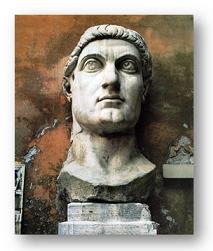The Church is Shaped: The Role of Constantine the Great
The Church is Shaped: The Role of Constantine the Great
The emperor Galerius died in 311. Succession rules were non-existent. Two years of conflict followed. Various generals vied for the crown. Two emerged most powerful: Maxentius in the East, Constantine in the West, each with his supporting armies. They finally met at the Milvian Bridge, across the Tiber River, 10 miles from Rome. Constantine was outnumbered 3:1. Maxentius had the Praetorian Guard — the best fighting unit ever seen! On the eve of the battle, Constantine saw a vision in the sky: the sign of the Cross and these words "in Hoc Signe Vinces " — (In This Sign Conquer). He did conquer and adopted Christianity as his religion and granted many favours to the church.
Edict of Milan, 313⤒🔗
While in the Italian city of Milan, Constantine issued and edict (a law or order) granting freedom from persecution and absolute freedom of religion. The pagan religions were not outlawed but Christianity was put on an equal legal footing. This brought with it many advantages for the Church:
- End of persecutions by the state.
- Many churches were built.
- Bishops and preachers paid (and paid well!) by the state.
- Sunday proclaimed a day of rest: work was forbidden and even soldiers were free of service to attend church.
However, this new freedom also brought with it many disadvantages, among which we can list the following as the most obvious and detrimental:
- The world entered the church: many pagans became nominal Christians for material gain. Church membership brought promotions and high positions. Bishops became rulers of cities and everywhere Christians took on leadership positions.
- Churches became wealthy; bishops lived luxuriously.
- The emperor decided he should rule the church. He called meetings of bishops to settle certain issues; these meetings were presided over by him or his representatives, not by the representatives of the Lord Jesus Christ, the only ruler of the church.
The results of all this can be summarised as follows:
- The church became outwardly strong and prosperous; inwardly weak and corrupt.
- This is the start of the thorny problem of the relationship between Church and State. Throughout the entire history of the Church, even till now, this has been a problem. Many battles (often physical!) have been waged over this issue.
Was Constantine a Christian? Although he tried to do much good for the Church, his personal life and conduct left much to be desired. There were many contradictions in his actions. In an attempt to prove his own Christianity, he attended Church regularly and urged all his people to do so. He forbade some heathen practices, harmful to the Church. He preached at court and claimed to be the bishop of the bishops. He took an active part in the Arian controversy and the Council of Nicea. However, he was not baptized until just before his death (337). In the Arian controversy he was not always orthodox. He was guilty of some atrocious crimes: he killed his own son without just cause; he once had a man executed after he had given him clemency.
Constantine stood between the old age and the new and partook of both. He used Christianity as a means to preserve the Roman Empire. The final judgment on this important, fascinating and puzzling figure had best be left in the hand of God who knows the heart.
Turning Points in Early Church History←⤒🔗
We may mark three major turning points in the history of the early church; three specific acts of God by which He caused His church to be multiplied:
- The Church is expelled from Jerusalem when Stephen is stoned to death (Acts 7).
- Missionary activity of Paul and others; the Church spread throughout the Mediterranean area in less than fifty years.
- Edict of Milan: gave Christians the same rights as others; in effect, it established Christianity as the state religion.
Julian "the Apostate"←⤒🔗
A nephew of Constantine, Julian, became emperor in 361. Brought up as a Christian, he remained a pagan at heart and showed his true colours when he began to rule. That is when it became known that he had become "apostate" (fallen away). There was some persecution of Christians, but not much, for the Church was, by now, too strongly established. With his clever and bitter pen, he tried to ridicule Christianity. He failed and the heathen temples were forsaken for good. In 363 he fell in battle against the Persians (today's Iranians). The story is that the dying man caught some of the blood spurting out of the mortal wound in his thigh, caused by a spear and as he threw the blood toward heaven, he exclaimed, "so Thou has conquered after all, Galilean!" and he died. From this time on there is no more opposition from the Roman government.

Add new comment